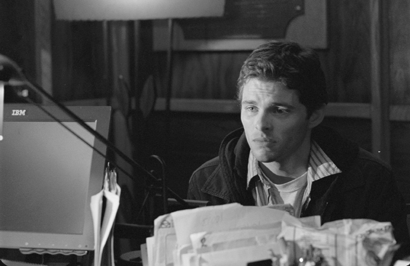Chris Terrio observes art-world New Yorkers in “Heights”
When a student playing Lady Macbeth decides to “raise the stakes” by handing her stage husband a pistol, actress Diana (Glenn Close) admonishes her students to “listen to the words” and then rants about how people have lost their passion.
“We’re not even ice! We’re tepid water!” she exclaims, noting how passively people can be when confronted with infidelity. Ironically enough, Diana and everyone around her seem to hide in plain sight when it comes to their true feelings.
“Heights” is the story of arty, privileged New Yorkers who, as one character observes, are “super-conscious” but “sleepwalk through their own lives.” They often talk of “real people”—as if they themselves aren’t real people. When Isabel (Elizabeth Banks) takes a photo of a woman and her child on the subway, she is admonished immediately: “Don’t you have your own fucking life?”
Diana flirts outrageously with Alec (Jesse Bradford) after he auditions for her, and we next meet Diana’s daughter, Isabel, and her hunky future son-in-law, Jonathan (James Marsden). That couple’s relationship fluctuates from ambivalence to jealousy and back again. They use walkie-talkies to stay in constant touch, but use their impending nuptials to hide real issues. Isabel would love to go on an exciting photographic assignment to Eastern Europe for Vanity Fair to capture “the real people” in her lens.
Meanwhile, Peter (John Light) arrives from London to research a Vanity Fair article about his own boyfriend Benjamin, a photographer, on the occasion of Benjamin opening a new exhibition of his work. It is only upon his arrival that he learns that the research involves interviewing a roster of ex-boyfriends and tricks Benjamin has photographed, the news coming from his editor (Isabella Rossellini, with an unfortunate haircut giving her a Dave Foley look).
How such a convenient list of exes is assembled goes unexplained, but this is how we discover that Jonathan is one of those exes. He’s also the cover boy on the photography catalogue that is the public image of Benjamin’s exhibit.
“Heights” is full of these coincidental situations, but it’s no comedy; instead, it’s full of sad, passive, unfulfilled people. Diana, bitter as she watches her husband fall in love with her own understudy, encourages Isabel to be sure about Jonathan before plunging into marriage.
Meanwhile, Peter is calm and professional interviewing his lover’s various tricks, each of whom verify that Benjamin is a jerk. “Heights” is full of moments when bad news is bluntly delivered, often by intimate friends, and yet there’s no angry, hysterical reaction. Characters convey a strange sense of “intake” instead of outrage. “Heights” is much like a Woody Allen movie—successful New Yorkers take taxis from their fantastically large apartments to elegant nightspots, parties and rooftop conversations.
Amy Fox, who originally wrote the story as a one-act play, and director Chris Terrio wrote the screenplay for “Heights.” The film expertly uses the visual strengths of cinema to underscore the underlying story’s themes. The concept of height is conveyed not only by rooftop conversations, but also with stage-to-audience dialogues. Diana finally realizes her marriage is over when she spies her husband openly affectionate with her understudy in her own home from a nearby balcony. Cater-waiter/actor Alec is absurdly dressed up in a tux serving hors d’oeuvres to a party full of half-naked guests, who are using binoculars to watch people across the street who are either having sex or staging it for the benefit of their voyeurs. Jonathan hopes to keep his interlude with Benjamin a secret from his photographer girlfriend, but Isabel is almost certain to go the exhibit.
Terrio uses a split-screen technique several times to great affect, usually while Isabel and Diana are talking on cell phones. Seeing them simultaneously catches their disconnection better than intercutting would; Isabel tries to say something important while Diana silently signs an autograph on her end. Produced by the Merchant-Ivory team, everything about the film, their first in New York in 20 years, is as good-looking as its cast.
Glenn Close is superb as Diana, a character who quotes Shakespeare rather than speaking her own mind. Close is a silent observing presence throughout the film, her image on phone booths, or floating by on a passing bus. Tellingly, she complains that she looks like Helen Keller’s teacher, Annie Sullivan.
Marsden, as the universal object of desire, does a great job of conveying indifference and misplaced anger. George Segal has a great small role as the rabbi the young couple go to for some pre-marrital intermarriage talks.
If anything, “Heights” is subdued without being restrained, a quality particularly well used to keep the “gay surprise” element in perspective. Whether Jonathan is gay, bi or simply had a one-time experience with Benjamin is not the point. “Heights” manages to present life as it often is. The film gives adult audiences a nice alternative to the usual summer blockbuster fare.
gaycitynews.com


































